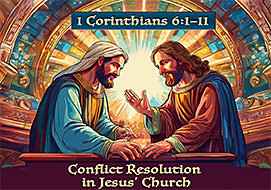First Corinthians 6:1–11 . . .
Settling Disputes Among Believers
These days, our national motto seems to have changed from “In God we trust” to “See you in court!” What we see today is nothing new. Two thousand years ago, in ancient Greece, the church in Corinth was “law suit happy.” [See how Greeks and Romans handled lawsuits in Jesus’ day.] Yet, Apostle Paul states clearly that Christians, of all people, ought to be able to settle their own disputes — out of court. The key in doing so is to understand our true identity in Christ; then we won’t have to wage war with other believers over material possessions or legal rights. Paul’s point is that we should live out who we are; in 6:1–11 (shown at the bottom of this page), Paul provides two exhortations that show us how.
1) Commit to settle disputes in the church (6:1–8). In his first eight verses, Paul poses eight straightforward questions to the church body members. By peppering the Corinthian believers with such questions, he hopes to help them clearly see that they’re in contempt of God’s righteous court. Paul is going to argue that believers should keep their civil conflicts out of the courts. When there’s a conflict between followers of Christ, it should be settled within the confines of the local church.
Starting in vv. 1–3, Paul continues his righteous rant with four direct questions designed to demonstrate how foolish it is for the Corinthians to throw their legal disputes before judges of the world. In vv. 4–8, he asks more questions and then tells the Corinthians what they should do when they have strife in their church. He’s telling them and us that it’s better and more appropriate to be a victim instead of a victor. In his first eight verses, Paul exhorts everyone to commit to settling disputes within the church; in his concluding section (vv 9–11), he reminds us that unbelieving judges in these courts will have nothing to do with and won’t recognize the kingdom of God.
2) Live out your new identity (vv. 9–11). To exhort believers to live like saints, Paul lists ten vices in the next three verses that characterize unbelieving sinners. He reminds the Corinthians that the judges they seek won’t spend eternity with them. Because they’re not brothers and sisters in Christ, they don’t have Christians’ best interests at heart.
In 6:11, Paul informs the Corinthians that they too “were” previously like Corinth’s wicked ilk. In spite of their serious behavioral problems, Paul insists that these Christians have a new identity; that they’ve been completely forgiven (“washed”), set apart as God’s children (“sanctified”), and declared righteous in God’s eyes (“justified”). Far from threatening their standing with God because of their sins, he affirms the security of their standing with God, in spite of their sins — sins of the flesh and sins of the spirit (2 Cor 7:1).
Note: 1st Corinthians challenges believers to examine every aspect of their lives through the lens of the Gospel. In chapters 5–7, Paul presents these three challenges:
Dealing with a case of incest (ch. 5) | Lawsuits among believers (ch. 6) | Concerning married life (ch. 7)
› Watch BibleProject’s superb animated video (1 min.) that highlights Paul’s messages in these three chapters.
† Summary of 1 Corinthians 6:1–11
The text of this passage addresses the issue of lawsuits among believers in the Corinthian church. Here’s my summary of the key points:
• The Problem of Lawsuits
Paul expresses concern about believers taking their disputes to secular courts instead of resolving them within the church community. He views this as a failure of the church and a poor witness to the world.
• The Church’s Role in Dispute Resolution
The apostle then argues that the church should be capable of settling disputes among its members. After all, he reminds the Corinthians that, because they’ll judge the world and even angels one day (vv. 2, 3), they have the capacity to adjudicate trivial cases among themselves.
• The Shame of Christian Lawsuits
In his opinion, Paul sees these lawsuits as a sign of defeat for the church, indicating a lack of wisdom and maturity among believers. He suggests that it would be better to be wronged or cheated than to take a fellow believer to court.
• Warning Against Unrighteousness
As a reminder, Paul tells the Corinthians that the unrighteous won’t inherit the kingdom of God. He warns his readers to avoid various sinful behaviors, including sexual immorality, idolatry, adultery, theft, greed, drunkenness, and swindling. Those poised to weigh morality should live morally amongst themselves (Warren Wiersbe).
• Transformation Through Christ
The passage concludes with a powerful statement of the transformative power of the gospel. Paul reminds the Corinthians that, although some of them once practiced these sinful behaviors, they’ve been washed, sanctified, and justified in the name of Jesus Christ and by the Spirit of God.
This eleven-verse passage emphasizes the importance of (1) maintaining unity and integrity within the Christian community, (2) resolving conflicts internally, and (3) living in a manner consistent with their new identity in Christ.
— — —
Years ago, in a worship service, Pastor Ray Stedman stepped to the pulpit and read the text for the day: Don’t fool yourselves. Those who indulge in sexual sin, or who worship idols, or commit adultery, or are male prostitutes or practice homosexuality, or are thieves, or greedy people, or drunkards, or are abusive, or cheat people — [pause for reflection] — none of these will inherit the kingdom of God. Some of you were once like that (vv. 9–11).
When Ray looked up with a bewildered expression on his face he said, I’m curious: How many of you have one or more of these sins in your background? If so, will you please stand up?
There was a young man there who’ad never been in a church before. He’d recently been saved at a Billy Graham crusade and came to church that Sunday with fear and trembling, not knowing what he’d find. He later said that when he heard the pastor’s question, he looked around to see if anyone was standing. At first, no one did, but soon most of the congregation were on their feet. He said to himself, These are my kind of people!
We can all find ourselves on Paul’s list. But when we confess our sin and accept the gift of eternal life that was paid for by Jesus’ death and resurrection, we become a new creation saved by grace (Romans 6:23; 2 Cor. 5:17).
Jesus washed my sins away
One glorious morning
He blessed my soul
And He made me whole
Ever since that happy day
I’m tellin’ the story
How He washed my sins away
When He blessed my soul
— The Gaithers —
Hear the Gaither Vocal Band
sing this classic hymn.
- Q. 1 Is it ever legitimate for a believer to use the secular court system?
- Q. 2 Are Christians forbidden to prosecute other Christians?
- Q. 3 Which of the ten sins listed in 6:9–10 are a temptation for you? How have you sought to overcome these sins?
1 Corinthians 6:1–11
New International Version (NIV)
[You can view it in a different version by clicking here; you can also listen to this chapter.]
Lawsuits Among Believers
6 If any of you has a dispute with another, do you dare to take it before the ungodly for judgment instead of before the Lord’s people? 2Or do you not know that the Lord’s people will judge the world? And if you are to judge the world, are you not competent to judge trivial cases? 3Do you not know that we will judge angels? How much more the things of this life! 4Therefore, if you have disputes about such matters, do you ask for a ruling from those whose way of life is scorned in the church? 5I say this to shame you. Is it possible that there is nobody among you wise enough to judge a dispute between believers? 6But instead, one brother takes another to court — and this in front of unbelievers!
7The very fact that you have lawsuits among you means you have been completely defeated already. Why not rather be wronged? Why not rather be cheated? 8Instead, you yourselves cheat and do wrong, and you do this to your brothers and sisters. 9Or do you not know that wrongdoers will not inherit the kingdom of God? Do not be deceived: Neither the sexually immoral nor idolaters nor adulterers nor men who have sex with men 10nor thieves nor the greedy nor drunkards nor slanderers nor swindlers will inherit the kingdom of God. 11And that is what some of you were. But you were washed, you were sanctified, you were justified in the name of the Lord Jesus Christ and by the Spirit of our God.

